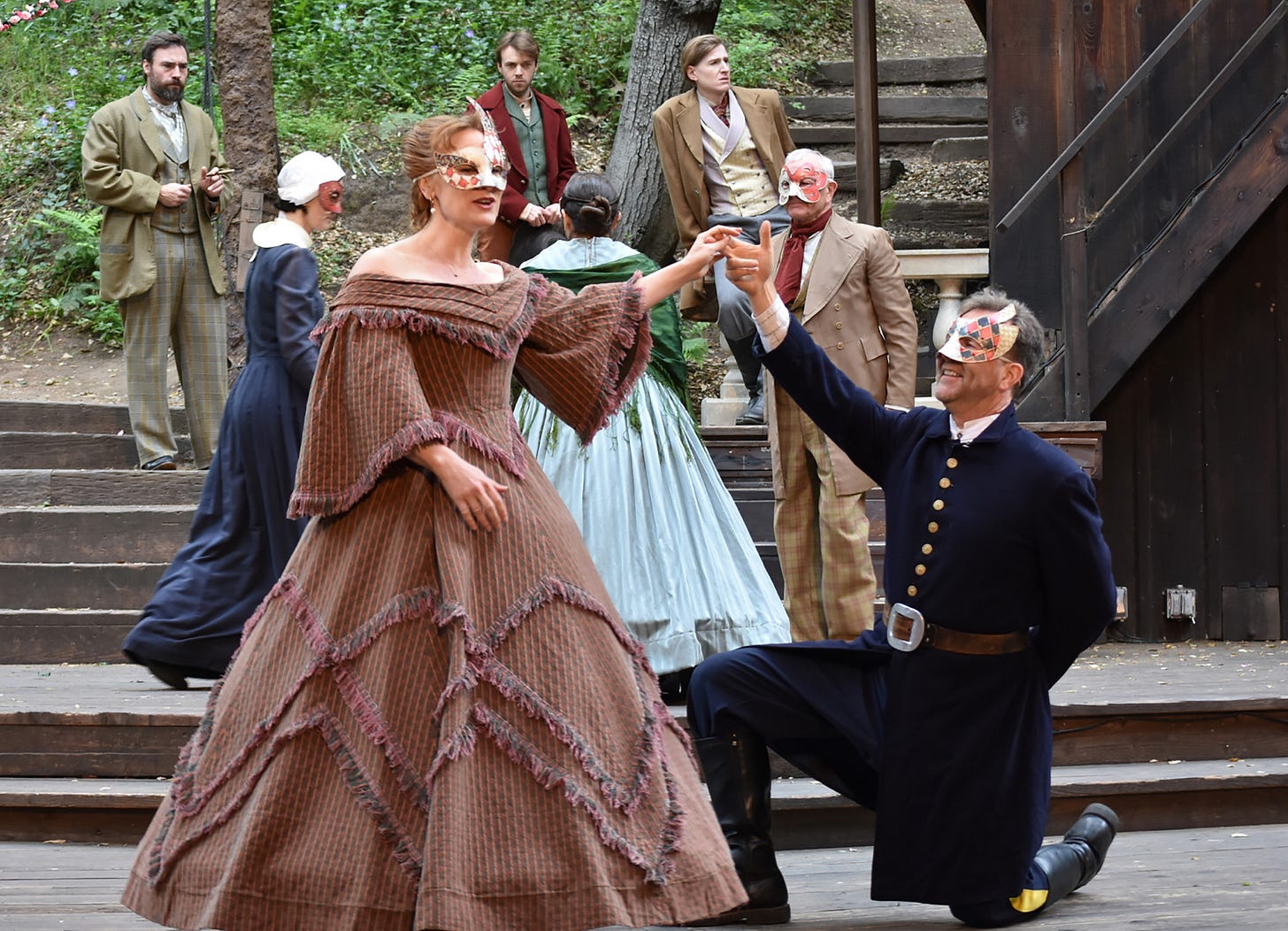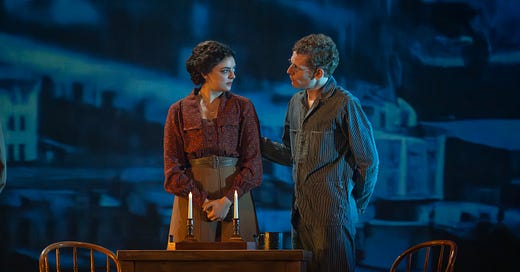A powerful 'Parade', a hapless 'Hamlet'
Theatricum re-opens, 'Reservoir,' 'Nice Girl,' 'Sorry,' 'The Wedding Singer,' and more
Are parades…theater?
If so, the June 14 parade in DC (for Trump’s birthday, Flag Day and Army Day) was a big, expensive flop. On the same day, anti-Trump No-Kings demonstrations were boffo hits — and some of them were quasi-parades. In downtown LA, thousands of protesters walked through closed-off streets from the Civic Center to Pershing Square — was that a parade?
But then there is “Parade,” the musical currently at the Ahmanson Theatre. Shortly after it begins, we witness spectators at a parade for Confederate Memorial Day — in Atlanta, 1913.
Eventually, we realize that “Parade,” the musical, is a theatrical experience that deserves additional “p” words from a critic’s handbook. Think pulsing, poignant, passionate, penetrating…and pertinent.
A story set in Georgia more than a century ago might not sound particularly pertinent. But this is the story of Leo Frank. He was the Atlanta resident who was convicted of murdering a young employee, Mary Phagan, at the pencil plant where he was the superintendent. A dubious governor commuted his death sentence to life imprisonment. But then a mob invaded the prison, kidnapped Frank, and lynched him in Mary’s home town of Marietta.
As the governor’s commutation indicated, there was substantial doubt even then about the verdict. Since then, the consensus of reputable researchers is that Frank was innocent. Foremost among them is Steve Oney, who wrote the meticulously annotated, 742-page “And the Dead Shall Rise” about the case, plus this later article.
Much of the local sentiment regarding Frank in 1913 reeked of antisemitism. Frank was a Jewish transplant from New York. He had even been elected president of the Atlanta chapter of B’nai B’rith, then a German-Jewish fraternal organization, and his conviction instigated the formation — at first within B’nai B’rith — of the Anti-Defamation League, now an independent non-profit. The Ku Klux Klan also revived in the wake of the Frank case (but Frank’s B’nai B’rith ties and these subsequent developments aren’t mentioned in the musical).
The accusations against Frank haven’t died, as displayed by the neo-Nazis who demonstrated at the first preview of this revival of “Parade” in 2023 in New York and an entire website that regularly impugns Frank. The current Defense Department’s new press secretary, Kingsley Wilson, has an online record of deriding the consensus of historians regarding Frank’s innocence. Just last week, on the day “Parade” opened in LA, Senator Jacky Rosen brought this up in a Senate committee during testimony by Defense Secretary Pete Hegseth, who brushed aside the senator’s questions.
So, although Frank was killed long ago, his case definitely has contemporary resonance.
However, perhaps the most remarkable achievement of the musical’s creators, writer Alfred Uhry and composer/lyricist Jason Robert Brown, is their ability to tell this ugly and unfortunately pertinent tale, while simultaneously depicting a much more inspiring and parallel narrative — about how Leo’s ordeal strengthened the bond between Frank and his wife Lucille, a native daughter of Atlanta Jewry.
The Frank marriage initially appears quite arid, but it blossoms after the imprisoned Leo allows Lucille to take the initiative in pursuing his case. Eventually Lucille visits Leo in a less restrictive session within the prison, and the score reaches its apex in the bittersweet song “All the Wasted Time,” which can best be described by another of the “p” words — poignant.
Not that the book and score have been devoid of previous or later highlights. Uhry (“Driving Miss Daisy,” “The Last Night of Ballyhoo”) grew up in the Atlanta Jewish world — and he knows the territory. Brown used a broad spectrum of musical styles related to the early 1900s and beyond to propel the story forward.
The gently pulsing melody of the opening number, “The Old Red Hills of Home,” which expresses the perspective of most white Southerners of that era, is briefly appropriated by Leo near the end, just as he’s about to be hanged. But he sings the “Sh’ma” in Hebrew instead of the Confederate-friendly lyrics heard at the beginning. It’s an ingenious moment — how did this cultural stew reach this devastating boiling point?
We hear several jaded perspectives on what’s happening. A reporter views the trial as his meal ticket. And prominently placed at the top of the second act is a duet in which two African-American employees of the governor share sardonic notes about how the Frank case has attracted much more attention from white Northerners than the frequent lynching of Blacks during that era.
Los Angeles saw a much smaller “chamber” version of “Parade” at the Mark Taper Forum, next door to the Ahmanson, in 2009. And (the apparently dormant) 3-D Theatricals produced “Parade” twice on relatively large stages, in 2013 in Fullerton and in 2018 in Cerritos and Redondo Beach.
But this current “Parade” is at the head of, well, that parade.
In the larger Ahmanson, set designer Dane Laffrey provides focus with a central platform for the actors in the middle of the stage, while Sven Ortel’s projections cover the back of the stage with documentary footage from the past, including front pages of Georgia newspapers with headlines about the case.
As Leo, Max Chernin unveils his character’s suppressed passion with a powerfully penetrating voice. So does Talia Suskauer, as Lucille. A couple of changes have been made in the score from the version that you might have heard in earlier productions or their recordings, but these probably matter only to intense devotees.
Although I occasionally criticize Center Theatre Group for relying too much on imported shows, I’m grateful that I didn’t miss this particular import. It’s definitely the highlight of artistic director Snehal Desai’s first complete CTG season.
Speaking of Desai’s first season, it also continues at the adjacent Taper with a revamped “Hamlet,” adapted and directed by Robert O’Hara, who is probably best known in LA theater for directing “Slave Play” at the Taper in 2022. His “Hamlet” first tells Shakespeare’s story in an updated version of the original, set in “Elsinore Castle, California,” then switches to a deconstruction within a film noir context, including a detective. There is no intermission between the two parts, and the deconstruction soon becomes exasperatingly anticlimactic and overextended.
Some of the design components are impressive, but they can’t do all of the work that’s necessary to maintain our interest in O’Hara’s visions. The Odyssey’s contemporary take on Shakespeare, “Lear Redux”, is much more engrossing — and much shorter.
By the way, I hope that no one reading about these productions at the Music Center hesitates to enter downtown LA because of Trump’s wild exaggerations about the recent atmosphere there. I also hope that LA playwrights are following the stories of Trump’s federal immigration agents wreaking havoc on non-violent Angelenos. Surely there is a play or several plays that could be written from some of these LA stories.
Yes, the Theatricum survived the nearby fires

The alfresco Will Geer Theatricum Botanicum in Topanga has begun its 2025 repertory season with two venerable English plays that have been adapted into American settings — Shakespeare’s “Much Ado About Nothing” and John Galsworthy’s “Strife” (plus, of course, the annual “Midsummer Night’s Dream”).
Ellen Geer’s staging of “Much Ado” is set in the immediate post Civil-War period in Lovingston, Virginia, a small town between Charlottesville and Lynchburg. Apparently many American soldiers passed through Lovingston on their way home from the vanquished South.
Of course the main event in “Much Ado” isn’t the trek by returning soldiers as much as the romances between two of them with local women — Beatrice with Benedick, her younger cousin Hero with Claudio. Would returning Civil War soldiers have stayed in Lovingston — or Virginia — long enough for such romances to develop? The question applies especially to Benedick and Beatrice, who seem to have an extensive history of flirtatious bickering. Guillermo Cienfuegos’ 2023 staging of “Much Ado” for A Noise Within in 2023 avoided such thoughts by having Allied soldiers in World War II stationed for some time in Messina, Sicily — which was also the site of the original play.
However, it’s still easy to avoid such thoughts in Topanga. Director Ellen Geer deploys Aaron Hendry’s Benedick and Willow Geer’s Beatrice to perform eye-catching, laugh-inducing physical stunts, many of them at the front lip of the stage. And, as usual at Theatricum, the play is set in so many different little stages throughout the company’s vast venue that you never get tired of looking at the same space for long. The play’s main villain wears a gray uniform instead of the Union-blue outfits worn by the others — is he a local Confederate from the Lovingston area who has returned separately? It isn’t spelled out, but feel free to speculate.
Most of Galsworthy’s “Strife” (1909) is set indoors, in the early 1900s in Pennsylvania instead of the original play’s locale in southwestern Great Britain. This labor/management drama doesn’t feel quite as comfortable in the Theatricum’s verdant outdoors as “Much Ado.” Striking workers demand a resolution beyond what their union has proposed. So the union leader (Brian Wallace) is in the middle, in between the crusty but aged board chairman (Franc Ross), whose own children are more sympathetic to the workers, and the workers’ most radical firebrand (Gerald C. Rivers). Too much speechifying by the workers and a mawkish subplot about the firebrand’s wife don’t help.
Galsworthy’s plays are so seldom revived in LA that I wondered if this might be the play’s LA County premiere. It isn’t. I found a reference to a Pasadena Community Playhouse production of “Strife” more than a century ago. “In the five years of their existence the community players have never done anything more finished…This is the first time that ‘Strife’ has been given on the Pacific Coast,” wrote a LA Times scribe on March 29, 1922.
LA’s other main summer Shakespeare festival, from Independent Shakespeare Company, opens this weekend with “Love’s Labour’s Lost,” in Griffith Park.

Why is his dam breaking?
Jake Brasch’s play at Geffen Playhouse, “The Reservoir,” begins with young Josh (Jake Horowitz) — a student on medical leave from NYU — awakening from an alcoholic bender on the beach at Cherry Creek Reservoir, a few miles southeast of Denver. Josh grew up nearby (and the play’s first production was from Denver Center Theatre Company in January).
Soon we hear a glancing reference to his father in Chicago, where his desperate mother is contemplating sending him. But most of the play is about Jake’s relationships with his grandparents — one set is Midwestern Christian, and the other set is Jewish. The grandmother from Nebraska (Carolyn Mignini) is already descending into dementia and soon into death, but the Jewish grandmother (Liz Larsen) is determined to help Jake recover. The grandfathers provide Jewish comic relief (Lee Wilkof) and Protestant stoicism (Geoffrey Wade).
At his menial book-shelving job at the bookstore where his mother also works, Jake learns from a book about the “reserves” in our brains that help keep us mentally active. But his own mind easily wanders far from everyday reality into fretting and fantasies.
Surprise — this play gets quite a few laughs. I chuckled, but I also found myself wondering why Brasch doesn’t delve more deeply into what might be causing Josh’s problems. Does the absence of his father have anything to do with any of this? Might Josh have attention deficit hyperactivity disorder (ADHD)? He attends some addiction-recovery sessions; has he seen a doctor?
Shelley Butler’s staging features some fine performances, including some remarkable multi-character turns by Marin Hinkle and Adrián González.
Do ‘Nice Girl’s say ‘Sorry’ too often?
Two plays with radically different styles have recently opened with a common theme — women stepping forward to assert themselves. Coincidentally, both were written by playwrights with the first name of “Melissa.”
“Nice Girl,” by Melissa Ross, is realistic, set in 1984 in middle-class Massachusetts. The title character Jo is a 37-year-old secretary who works in an accounting office. She has a new friend there, but she otherwise spends all of her time living with and looking after her mother. She once had a scholarship to Radcliffe but soon dropped out in order to help her mother care for her father, who would soon die. She has been providing for her mom since then, but now a local butcher suggests that he and Jo attend a high-school reunion together. A couple of questions about the script arise. Yet in the extremely intimate space upstairs at Rogue Machine (on Melrose), Anaïs Fairweather delivers a terrific performance as the deeply repressed Jo. She receives splendid support from the rest of the cast, under the direction of Ann Bronston.
“Sorry,” by Melissa R. Randel, is non-realistic to the max. At Moving Arts in Atwater, it’s a sterling example of fantastical writing that remains mostly coherent and engaging throughout — even when characters are dreaming, even though its two human women are from different centuries and the third woman is Persephone, who is tired of living in Greek myth. The cast also includes a trio of female Furies and one man who plays all the male roles in the women’s adventures. Randel herself appears as Persephone and co-directs with Larry Biederman, supported by a crackerjack design team — especially Sloe Slawinski on sound. But “Sorry” is too long — about 2 ½ hours including an intermission. I’m sorry, but “Sorry” might need the services of a skilled dramaturge.
Closing this weekend
Productions of two stage scripts based on popular movies are closing this weekend.
In “The Wedding Singer” at the Colony Theatre in Burbank, the satire and comedy and energy pop like gangbusters. This tale of a mediocre wedding singer who himself is jilted at the altar of his own would-be wedding is based on the 1998 film written by Tim Herlihy, who co-wrote the stage script with Chad Beguelin — who also wrote the clever lyrics for Matthew Sklar’s songs. I didn’t appreciate it in a 2011 production at a much larger theater in greater LA, but it’s a perfect fit for the mid-size Colony. Director Michael Donovan’s cast is exceptional, with Blake Jenner in the hapless title role, Kay Cole as his grandma, Hannah Sedlicek as the post-jilt woman who enters his life and Juliane Godfrey as her feisty friend.
Group Repertory Theatre in North Hollywood is producing what appears to be the first Greater LA production of “Network,” based on the 1976 movie. Lee’s adaptation of Paddy Chayefsky’s screenplay won an Olivier Award for best new play in London in 2018. Of course the movie’s message about the danger of demagogues in the media always feels fresh even as the media evolve. Today, the arena has largely shifted away from network TV to thousands of online platforms. Still, the musical remains engrossing and entertaining, as directed by Tom Lazarus, with Bert Emmett as Howard Beale (the Peter Finch role) and Michelle McGregor as Diana (the Faye Dunaway role). The staging requires too many set changes, but Mikaela Padilla’s sound design keeps us entertained with vintage ‘70s pop.
Also closing this weekend:
“Greenwood 1964,” at Greenway Court Theatre, is set during the famous Freedom Summer of 1964, as then-influential Black performers Harry Belafonte and Sidney Poitier personally deliver a stash of cash to Fannie Lou Hamer and other civil rights activists in Mississippi. Playwright Mohammed Ali Ojarigi places the two celebrities in a run-down attic, aware that the Klan is very close, but the play broadens the visual scope with plenty of projections and a riveting supporting performance by Joy DeMichelle as Hamer. It also creates some contention between the two celebrities, leading to some physical tussling, over their somewhat different paths to this moment. Tracey Dukes as Belafonte is a bit more convincing than Eltony Williams’ Poitier, who has the right voice but who looks like an obvious bodybuilder more than like Poitier. I suspect that the play might be an unspoken bid to stir up interest in making a movie about the incident — one of the actual events was a car chase in which the KKK pursued the stars, which is hard to depict in a small theater.
“The Angel Next Door,” by Paul Slade Smith at International City Theatre in Long Beach, is a mildly meta-theatrical farce set in 1948 during a summer at the shore among New York theater people. The script isn’t nearly as substantive or as polished as the same playwright’s recent “The Outsider,” which ICT produced a year ago.



